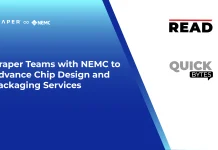Teledyne LeCroy, the worldwide leader in protocol test solutions, announced availability of new PCI Express 6.0 EDSFF interposers, providing connectivity to Teledyne LeCroy’s PCI Express protocol analyzers using the latest PCIe 6.0 and CXL specifications for analysis of enterprise and datacenter small form factor (EDSFF) E1.S, E1.L, E3.x type solid-state drives (SSDs) and devices. These new interposers are based on the new Teledyne LeCroy TAP6 technology that reduces signal integrity issues for enhanced probing in high-speed projects.
EDSFF devices designed for high performance systems make up an important and growing segment of the enterprise and datacenter storage devices market. Based on the PCIe 6.0, NVMe and CXL specifications, the EDSFF interface can support speeds of up to 64GT/s. Now design and test engineers can test, identify issues, and optimize EDSFF (E1.S, E1.L, E3.x) type memory systems and solid-state drive performance using Teledyne LeCroy PCIe 6.0 EDSFF interposers.
Also Read: Certus-NX-RT FPGA Completes Radiation Qualification and Shipping Flight Grade Units
These new Teledyne LeCroy PCIe 6.0 EDSFF Interposers support data rates of 2.5, 5.0, 8.0, 16.0, 32.0, and 64.0 GT/s with up to x16 link widths. It provides a simple and easy-to-use way to probe PCIe traffic between a host and PCIe add-in card. In combination with Teledyne LeCroy’s Summit family of PCI Express 5.0 protocol analyzers, the interposer now enables engineers to test product designs to 32 GT/s. Future Summit protocol analyzers, coming soon, will use the full potential of the PCIe 6.0 EDSFF Interposer at full 64 GT/s speeds.
Teledyne LeCroy is a leading manufacturer of advanced oscilloscopes, protocol analyzers, and other test instruments that verify performance, validate compliance, and debug complex electronic systems quickly and thoroughly. Since its founding in 1964, the Company has focused on incorporating powerful tools into innovative products that enhance “Time-to-Insight”. Faster time to insight enables users to rapidly find and fix defects in complex electronic systems, dramatically improving time-to-market for a wide variety of applications and end markets.
SOURCE: PR Newswire




